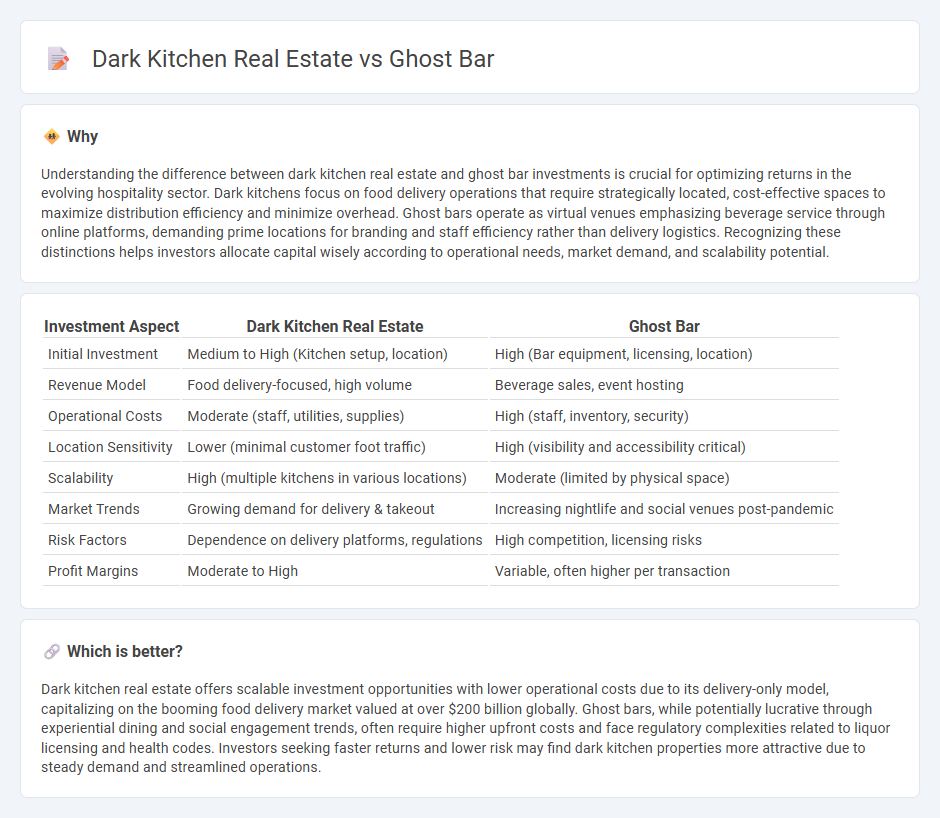
Dark kitchen real estate focuses on optimizing location and facilities specifically designed for delivery-only food services, boosting operational efficiency and reducing overhead costs. Ghost bars, on the other hand, emphasize flexible event spaces and beverage services without a traditional storefront, targeting a niche market for pop-up experiences and private parties. Explore the distinct investment opportunities and growth potential in these emerging real estate segments.
Why it is important
Understanding the difference between dark kitchen real estate and ghost bar investments is crucial for optimizing returns in the evolving hospitality sector. Dark kitchens focus on food delivery operations that require strategically located, cost-effective spaces to maximize distribution efficiency and minimize overhead. Ghost bars operate as virtual venues emphasizing beverage service through online platforms, demanding prime locations for branding and staff efficiency rather than delivery logistics. Recognizing these distinctions helps investors allocate capital wisely according to operational needs, market demand, and scalability potential.
Comparison Table
| Investment Aspect | Dark Kitchen Real Estate | Ghost Bar |
|---|---|---|
| Initial Investment | Medium to High (Kitchen setup, location) | High (Bar equipment, licensing, location) |
| Revenue Model | Food delivery-focused, high volume | Beverage sales, event hosting |
| Operational Costs | Moderate (staff, utilities, supplies) | High (staff, inventory, security) |
| Location Sensitivity | Lower (minimal customer foot traffic) | High (visibility and accessibility critical) |
| Scalability | High (multiple kitchens in various locations) | Moderate (limited by physical space) |
| Market Trends | Growing demand for delivery & takeout | Increasing nightlife and social venues post-pandemic |
| Risk Factors | Dependence on delivery platforms, regulations | High competition, licensing risks |
| Profit Margins | Moderate to High | Variable, often higher per transaction |
Which is better?
Dark kitchen real estate offers scalable investment opportunities with lower operational costs due to its delivery-only model, capitalizing on the booming food delivery market valued at over $200 billion globally. Ghost bars, while potentially lucrative through experiential dining and social engagement trends, often require higher upfront costs and face regulatory complexities related to liquor licensing and health codes. Investors seeking faster returns and lower risk may find dark kitchen properties more attractive due to steady demand and streamlined operations.
Connection
Dark kitchen real estate and ghost bars share a strategic connection in investment through leveraging underutilized urban spaces for high-demand food and beverage services. Both concepts optimize operational efficiency by minimizing front-of-house costs while maximizing delivery revenue, attracting investors interested in scalable, low-overhead hospitality models. The growing trend of digital ordering platforms fuels their rapid market expansion, making them lucrative real estate assets with significant return potential.
Key Terms
Lease Agreement
Ghost bars often operate within flexible, short-term lease agreements tailored to pop-up concepts, minimizing overhead costs and maximizing location adaptability. Dark kitchens typically require longer, more stable lease terms due to substantial investments in kitchen infrastructure and operational equipment. Explore detailed lease strategies to optimize your real estate decisions for ghost bars and dark kitchens.
Zoning Regulations
Zoning regulations play a critical role in the establishment of ghost bars and dark kitchens, often dictating permissible locations and operational constraints. Ghost bars, typically classified under mixed-use or commercial zoning, face restrictions related to noise, alcohol licensing, and public access, whereas dark kitchens predominantly operate in industrial or commercial zones with lenient food preparation rules but strict health and safety standards. Explore the nuances of zoning laws to optimize your real estate strategy for ghost bars and dark kitchens.
Tenant Improvement Allowance
Tenant Improvement Allowance (TIA) for ghost bars typically exceeds that of dark kitchens due to the higher customization required for immersive ambiance and specialized equipment installation. Dark kitchens prioritize functional layouts and efficient workflow, resulting in moderate TIA focused on industrial-grade utilities and ventilation systems. Explore detailed comparisons to optimize your real estate investments and tenant improvement strategies.
Source and External Links
Ghost Bar Atlanta (@ghost_bar_atlanta) - Instagram - Official Instagram page of Ghost Bar Atlanta, a nightlife venue located at 345 Edgewood Ave SE in Atlanta, Georgia.
Miami - Ghost Bar - Restaurant & Lounge - Ghost Bar located next to Seminole Hard Rock Hotel & Casino in Hollywood, FL, offering food, drinks, music, and upscale service.
Reservations - Ghost Bar - Restaurant & Lounge - Website for making reservations at Ghost Bar restaurants, including locations in Davie, FL and Miami, with photos and directions.
 dowidth.com
dowidth.com